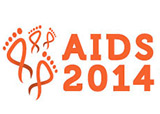 A meta-analysis of studies examining the sexual behaviors of people with HIV after they started treatment found that, at least among heterosexuals in the poorer nations covered, there was no evidence of people using condoms less, aidsmap reports. Researchers presented their findings of the meta-analysis at the 20th International AIDS Conference (AIDS 2014) in Melbourne, Australia.
A meta-analysis of studies examining the sexual behaviors of people with HIV after they started treatment found that, at least among heterosexuals in the poorer nations covered, there was no evidence of people using condoms less, aidsmap reports. Researchers presented their findings of the meta-analysis at the 20th International AIDS Conference (AIDS 2014) in Melbourne, Australia.
The investigators culled together 37 studies of low- and middle-income nations, published between 1990 and May 2012, that provided treatment to participants and then combination antiretroviral (ARV) therapy once it became available. Thirty of the studies were conducted in sub-Saharan Africa, four in Thailand, two in Brazil and one in India. They compared the sexual behaviors of people taking ARVs with those not on therapy, or they analyzed how behaviors changed after individuals started therapy.
While the combined studies provided information on various forms of sexual risk taking, this meta-analysis was restricted to 15 studies that looked at differences in condom use.
The study found that those who were receiving HIV therapy were 80 percent more likely to use condoms than those who were not taking ARVs. Condom rates doubled among women taking ARVs when compared with women not on therapy. Among men receiving treatment, condom usage was 50 percent higher than among those men not receiving treatment. When people in the studies had sex with someone HIV negative or whose serostatus they did not know, their likelihood of using a condom was 160 percent higher. Study participants were also 160 percent more likely to use condoms with their spouses or regular partners if on treatment.
This study is limited by the fact that it only looked at the behaviors of heterosexuals in developing nations, and so it cannot make projections about, for example, the sexual risk taking of HIV-positive gay men in the Western world.
To read the aidsmap story, click here.
To read the conference abstract, click here.
To watch the conference presentation, click here.
Advertisement
Advertisement
Advertisement






Comments
Comments